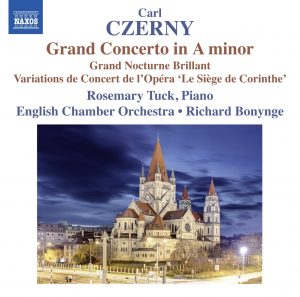The early part of the nineteenth century was a fascinating period in the development of the piano concerto. With the public’s appetite for virtuoso performers, and with composers only too happy to oblige, much of the music was exuberant and high spirited, by turns lyrical and wistful but always written to delight and to show off the technical prowess of the soloist. Concertos by Cramer, Czerny, Field, Herz, Hummel, Moscheles, Ries and Weber were all popular in their day but have since fallen out of favour and are rarely played today, if at all. This release from Naxos of Czerny’s Grand Concerto in A minor and other works is a welcome reminder of the brilliance of this bygone era.
Carl Czerny (1791 – 1857) is perhaps best known today for his numerous volumes of piano studies which are still inflicted on students today but he was also an indefatigable composer, arranger, pianist, and teacher, his most famous pupil being the 9 year old Franz Liszt. Schumann however once rather unfairly dismissed Czerny’s music, along with other virtuoso pianist-composers, as “amongst music’s weeds”.
His Grand Concerto in A minor is a pleasing work with glittering displays of fiendish passagework, whose style owes much to Hummel; if it lacks the latter’s elegance it makes up for it with more inventive writing for the piano. The playing here is perhaps a little understated in the first movement and lacking in drama but Tuck impressively navigates the pianistic minefield in the development section as the difficulties pile up to reach a thrilling conclusion. For such a beautiful opening, the slow movement feels decidedly truncated and shows signs of being written in a hurry for no sooner have we been eased into it, then a rather unconvincing cadenza acts as a bridge into the jaunty third movement. There is much fun to be had here and Tuck is in fine fettle; while Czerny does not have Hummel’s mastery of form, the piano writing is sparkling and the conclusion breathtaking.
“Had I enemies, I would annihilate them in forcing them to listen to music like this” wrote Schumann of Czerny’s music (Schumann, it has to be said, disliked virtuosity for its own sake). Presumably he wasn’t referring to the congenial Grand Nocturne Brilliant which bustles along with a playful inventiveness and irresistible charm. While it’s less than the sum of its glittering parts, Tuck dishes up an undeniable crowd-pleaser. Chopin was surely more accurate and fair when he described Czerny as “… the Viennese specialist in the manufacture of all sorts of musical sweetmeats”. This is particularly true of the Variations de Concert de l’Opéra ‘Le Siège de Corinthe’. It shares with the Grand Nocturne Brilliant a lively sense of fun and invention but also the feeling that it could end at any moment, that each dramatic build is the final one. As before, Tuck hits the spot in this delicious confection which scores nul points for gravity but dix points for charm.
The recording is well-balanced (although the piano sounds a little thin in the upper range) and it comes with generous and informative notes on the music.
Kevin Painting
@berggasse
Published 21 June 2016 on primephonic.
Rating
Performance: 3 stars
Recording: 3 stars
Details
 Carl Czerny
Carl Czerny
Grand Concerto in A minor, op 214
Grand Nocturne Brilliant, op 95
Variations de Concert de l’Opera ‘Le Siege de Corinthe’, op 138
Rosemary Tuck (piano)
English Chamber Orchestra / Richard Bonynge
Naxos NAC8.573417